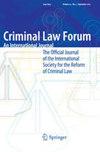利用公众调查铲除腐败与勾结——加拿大的经验
IF 0.8
Q3 CRIMINOLOGY & PENOLOGY
引用次数: 1
摘要
公共调查委员会是政府在特殊情况下使用的一种行政工具,用于调查和报告具有重大公共重要性的争议。这样的调查可以让公众更好地了解丑闻或悲剧的复杂性,但当犯罪活动发生时,却无法提供最终的问责。在加拿大,利用公共调查委员会调查腐败和勾结,从宪法权力分工的角度(联邦和省级政府之间)和根据《加拿大权利和自由宪章》保护被告的权利方面提出了重大的法律挑战。通常,当犯罪行为成为争议的核心时,政府将等待所有调查和起诉完成,然后再对任何剩余的具有公共重要性的问题展开公开调查。然而,腐败丑闻的规模和公众对答案的日益增长的要求,可能使政府别无选择,只能立即发起公开调查,即使存在损害刑事调查和起诉的严重风险。本文讨论了与犯罪、腐败和勾结的公共调查委员会的创建和运作相关的法律困难,并提出了在分析开始和随后在操作层面可能采取的各种措施以最大限度地降低法律风险的前进方向。本文章由计算机程序翻译,如有差异,请以英文原文为准。
The Use of Public Inquiries in Rooting Out Corruption and Collusion – The Canadian Experience
A public commission of inquiry is an administrative tool used exceptionally by governments to inquire into and report on controversies of significant public importance. Such inquiries allow the public to better understand the complexities of a scandal or tragedy, but provide no ultimate accountability when criminal activity is at play. In Canada, the use of public commissions of inquiry to investigate corruption and collusion poses significant legal challenges from a constitutional division of powers perspective (between the federal and provincial levels of government) and with regards to the protection of the rights of the accused under the Canadian Charter of Rights and Freedoms . Typically, when criminal conduct is at the heart of the controversy, governments will wait for the completion of all investigations and prosecutions before launching a public inquiry into any remaining matter of public importance. However, the scale of a corruption scandal and the growing public demand for answers may be such that a government is left with no option but to launch a public inquiry immediately, even if there are serious risks of compromising criminal investigations and prosecutions. This paper discusses the legal difficulties associated with the creation and operation of public commission of inquiry into crime, corruption and collusion in particular, and presents a way forward in analysing the various measures that may be adopted at the onset and susbsequently at the operational level to minimize legal risks.
求助全文
通过发布文献求助,成功后即可免费获取论文全文。
去求助
来源期刊

Criminal Law Forum
Multiple-
CiteScore
1.00
自引率
0.00%
发文量
17
期刊介绍:
Criminal Law Forum is a peer-review journal dedicated to the advancement of criminal law theory, practice, and reform throughout the world. Under the direction of an international editorial board, Criminal Law Forum serves the global community of criminal law scholars and practitioners through the publication of original contributions and the dissemination of noteworthy public documents. Criminal Law Forum is published pursuant to an agreement with the Society for the Reform of Criminal Law, based in Vancouver, British Columbia.
 求助内容:
求助内容: 应助结果提醒方式:
应助结果提醒方式:


